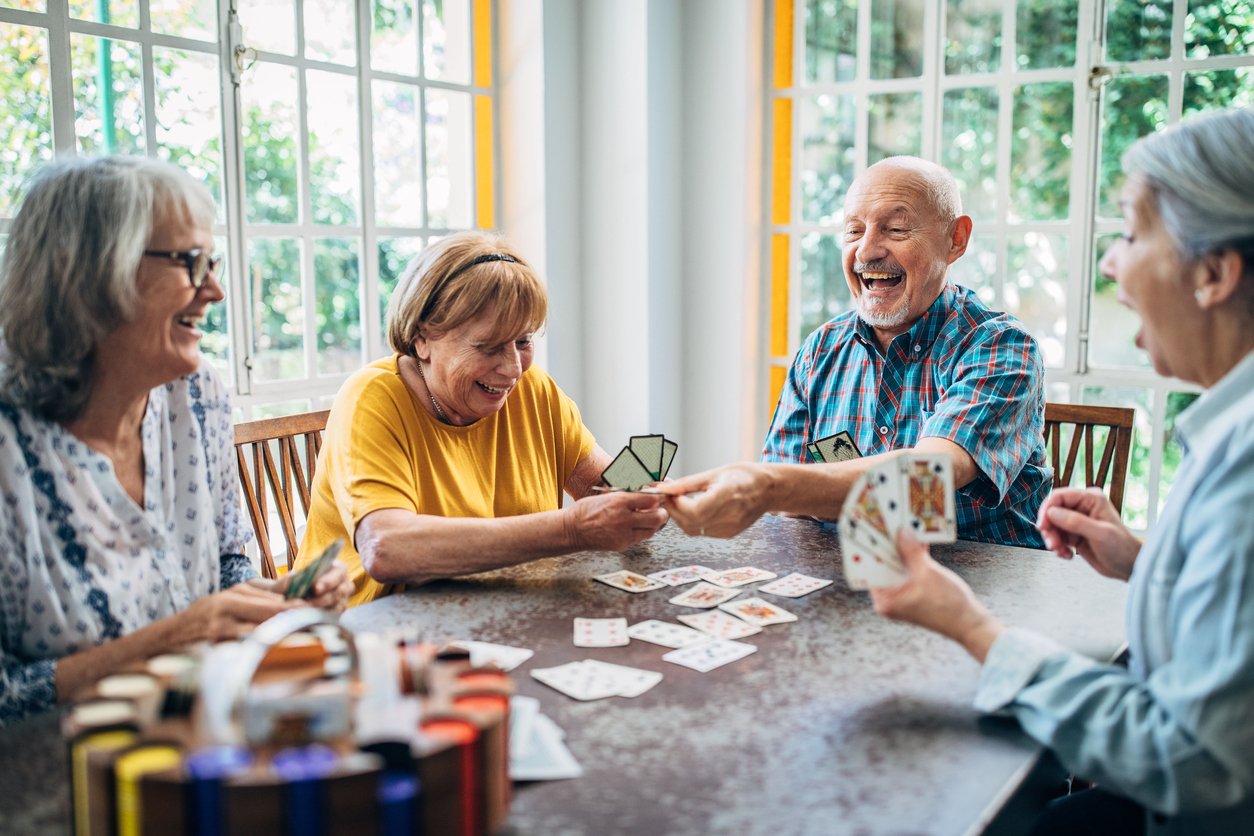5 Engaging Memory Care Exercises
Caring for a family member who has Alzheimer's disease or dementia is challenging. Part of your duty as a caregiver is to provide stimulating activities and pastimes to help keep your loved one engaged. But it can become a struggle to stay upbeat and playful, and even become harmful to your own mental health, without the proper care for their declining mobility, memory, or motor skills.
At Weatherly Inn, we know how challenging these situations can become. So we've put together a list of five engaging memory care activities you can use to keep your loved one engaged and help slow the progression of their disease. From tabletop puzzles to routine household tasks, we'll cover a few memory games and meaningful activities here.
Remember, a stimulating environment is crucial to your loved one's well-being and overall quality of life! So consider implementing a few of these basic activity ideas and memory care exercises. And most importantly, keep it fun!
1. Puzzles and Games for Memory Care
Providing any sort of home care for Alzheimer's patients or dementia patients requires tasks that strengthen their cognitive abilities. Puzzles make for excellent memory care exercises. And they can be a great activity for everyone in the house! From online puzzles and Match 3 puzzle games (like Candy Crush Saga) to traditional tabletop jigsaw puzzles, these pastimes are just as engaging to older adults as they are to youngsters. If you're shopping for puzzles and games we have a few "pieces" of advice for you:
- - Buy new jigsaw puzzles with themes your family member finds attractive. Whether they love classic cars, hummingbirds, or horses, a quick internet search will reveal plenty of options.
- - Don't bring puzzles home from a thrift store or yard sale. The inability to finish a tabletop puzzle because it's missing some pieces is frustrating for everyone, especially those who deal with dementia or memory loss.
- - Select puzzles with large pieces. 300 pieces or fewer is a good starting point.
Boardgames can be an engaging way to spend a rainy afternoon with your elderly family member too. Just make sure to set expectations in advance. If you're on a tight schedule, set a timer ahead of time and explain to your family member that you can play for an hour and no more. There's less chance they'll be disappointed if you need to end the game early.
This Senior Link Blog reminds us that board games for folks with dementia or Alzheimer's should work on several levels. "A board game with a colorful playing surface and objects that can be handled [like dice and cards] is better than a game that does not contain these features; the more sensory stimulation, the better." Just keep a keen eye on tiny pieces!
If you are not able to get your hands on any of the above items, consider using more readily accessible items for the following activities:
- - Crossword puzzles
- - Playing cards
- - Tic-Tac-Toe
- - Games that incorporate light physical activity like hide-and-seek (with grandkids) or a treasure hunt around the house
2. Organizing Items: Household Chores Your Family Member Can Help With
There are some light household chores and organizing tasks your senior loved one can help with that also make valuable memory care exercises and offer some notable physical benefits.
These tasks will keep them engaged and involved and give them a sense of duty in the household. By assigning them light chores to be done and writing them on a visible calendar your loved one can refer to, you'll improve their sense of time passing and give them the feeling they're "pulling their own weight" in the home.
Consider these practical tasks as memory care exercises:
- - Folding laundry and putting it away in the correct drawer for themselves and others in the home
- - Matching socks from a basket
- - Putting away groceries in the pantry
- - Sorting through a junk drawer (with no knives in it)
- - Organizing books on a shelf by title, size or color
Avoid any chore that involves sharp objects or hot tools, so no ironing! And it helps if you can play music, add humor, or even incorporate some outright silliness to chores.
Nearly any task that involves organizing objects is beneficial to improve cognitive skills. Set your family member in front of a cupboard and ask them to sort the canned goods. Or ask them to organize photos for a family photo album project (which can also provide them with a sense of reminiscence and an opportunity for self-expression).
3. Scrapbooking: A Meaningful Memory Care Activity
As senior living communities encourage a physical exercise program, memory care facilities encourage mental exercises that are built on the concept of reminiscing. A great way to do that at home is to create a scrapbook or family photo album with your loved one. It's a meaningful way for your family to bond together, remember important days, and solidify family bonds. It's also important that individuals suffering from memory loss engage in social activities, and scrapbooking can definitely kickstart some wonderful conversation if done as a family.
Remember, as your loved one enters the later stages of dementia and Alzheimer's disease, they may have a hard time remembering the names and faces of family members. This can be especially hurtful to home care providers who are investing so much time and effort into providing quality health and memory care. If your loved one struggles to identify you or identify important events (like photos of your wedding day), try not to take it personally! We know it's easier said than done, but your loved one isn't trying to hurt your feelings. It's the effect of the disease, not their own will.
4. Using Photos From Their Past
Whether you're scrapbooking, creating a collage, framing photos, or merely trying to pass a few hours on a rainy afternoon, use pictures from your loved one's past whenever possible. If you weren't present at the event, you could still jog their memory by discussing the photo's details.

Ask them questions or make comments about the picture like:
- - What a lovely dress you had on that day. Do you remember where it came from?
- - This looks like it happened at a hotel; where was this at?
- - I can tell this photo was taken at the beach. I wonder which beach this is, it looks amazing!
By prompting them with some details, you might be able to bring the special event back in their memory. Be positive and discuss their clothing, shoes, the weather — any little detail might jog their memory.
5. Periodicals: Browsing Old Magazines and Newspapers Is a Great Memory Care Activity
Some folks don't have boxes of family photos, and that's fine. Caregivers can still invoke old memories by pouring over older magazines, newspapers, and postcards. If you don't have access to a stack of old news, you can purchase magazines that honor historical figures and events. Just be sure to keep it lighthearted.
For instance, if your loved one is a veteran, perhaps he or she would enjoy a magazine about wartime technology or airplane nose art. But it's best to avoid direct references to something traumatic, so skip the "World War II in Color" movies and books.
Finally, the last piece of advice we'd offer to anyone providing Alzheimer's or dementia care is to keep the sessions short. Don't expect to schedule a two-hour session of laundry sorting or puzzles. Keep an eye on your family member. If they start getting frustrated, tired, or agitated, it's time to move on.
Here at Weatherly, we understand that caring for a family member who has dementia or Alzheimer's can quickly become overwhelming. As their disease progresses, you may find it hard to provide the quality health care and memory care your loved one deserves while keeping up with normal household chores and a career outside the home.
If you need help to provide the right care for your family member, in the form of temporary day & respite care, or if you're considering the move to a memory care home, then contact us. We're here to help.
Related Reading & Resources:
